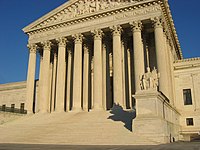US Supreme Court overturns death penalty for child rape
Wednesday, June 25, 2008
| The death penalty should not be expanded to instances where the victim's life was not taken. | ||
—Justice Anthony Kennedy | ||
In a 5-4 vote, the United States Supreme Court overturned the death penalty for Patrick Kennedy, convicted of raping a child, saying it is not proportional to the crime and that it violates the Constitutional ban on cruel and unusual punishment, and thereby setting a precedent.

In the case Kennedy v. Louisiana, Patrick Kennedy of New Orleans, Louisiana was convicted of raping his eight-year old stepdaughter, and was sentenced to death for the crime. A Louisiana law adopted in 1995 allowed the death penalty for those who had raped a child under 12 years old (later amended to 13). Five other states have similar laws, while the remaining states ban the death penalty for rape. The last execution for rape in America occurred in 1964.
The Louisiana Supreme Court defended Kennedy's sentence, saying that "short of first-degree murder, we can think of no other non-homicide crime more deserving" of the death penalty. Kennedy, who was one of two criminals on death row in America who did not commit murder, challenged the court's decision, and the case was brought to the U.S. Supreme Court.

Writing for the majority, Justice Anthony Kennedy said the Constitution did not allow the death penalty where the crime did not result, and was not intended to result, in a person's death. He noted exceptions in cases of crimes against the state, such as treason and espionage. Despite "the years of long anguish that must be endured by the victim of child rape," Justice Kennedy wrote, "the death penalty should not be expanded to instances where the victim's life was not taken." He added, "When the law punishes by death, it risks its own sudden descent into brutality, transgressing the constitutional commitment to decency and restraint."
| It is the judgment of the Louisiana lawmakers and those in an increasing number of other states that these harms justify the death penalty. | ||
—Justice Samuel Alito | ||
The four liberal-leaning justices (Stevens, Souter, Ginsburg and Breyer) joined Kennedy, a moderate who often casts the deciding vote in close cases. The four conservative-leaning justices (Roberts, Scalia, Thomas and Alito) dissented.
Samuel Alito wrote in his dissent, "The harm that is caused to the victims and to society at large by the worst child rapists is grave... It is the judgment of the Louisiana lawmakers and those in an increasing number of other states that these harms justify the death penalty." Alito said the decision would bar the death penalty "no matter how young the child, no matter how many times the child is raped, no matter how many children the perpetrator rapes, no matter how sadistic the crime, no matter how much physical or psychological trauma is inflicted, and no matter how heinous the perpetrator's prior criminal record may be."
Louisiana governor Bobby Jindal also criticized the court's decision. "One thing is clear: The five members of the court who issued the opinion do not share the same 'standards of decency' as the people of Louisiana," Jindal said.
Sources
- Mark Sherman, Associated Press. "Court bans death penalty for child rape" — Houston Chronicle, June 25, 2008
- Vittorio Hernandez. "Supreme Court Rejects Death Penalty For Louisiana Child Rapist" — All Headline News, June 25, 2008
- David Stout. "U.S. Supreme Court rules out death for child rapists" — International Herald Tribune,